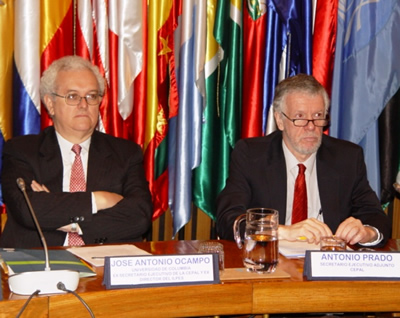"Planning for Development Is Back in Latin America and the Caribbean"
Topic(s)
Antonio Prado inaugurated the seminar in commemoration of the 50th anniversary of ILPES at ECLAC's headquarters, where the Colombian economist José Antonio Ocampo made a presentation.

(2 July 2012) "Planning for development is back with a renewed strength and complex challenges," said today the Deputy Executive Secretary of ECLAC Antonio Prado, when opening the commemorative seminar to celebrate the fiftieth anniversary of the Latin American and Caribbean Institute for Economic and Social Planning (ILPES) at the organization's headquarters in Santiago, Chile.
ILPES was created by ECLAC on 2 July 1962 in the aim of supporting Latin American and Caribbean governments in the field of planning and public administration by providing training, consultancy and research services.
"Closing the multiple gaps in the region takes a long-term vision, strategic planning and long-lasting persistence," highlighted Prado at the international seminar that will conclude tomorrow. "The State must be capable of providing strategic management for the long run, looking ahead, and being involved in the design of strategies for guiding national development," he emphasized.
In this context, the high-level official announced that during ECLAC's Thirty-fourth Session, to be held from 27-31 August this year in El Salvador, the document Cambio estructural para la igualdad. Una visión integrada del desarrollo (Structural Change for Equality. An integrated vision of development), will be presented. The book elaborates on the concepts set forth in the document Time for Equality. Closing gaps, opening trails (2010), specifically proposing to strengthen the role of the State.
In the first day of the seminar, Jorge Máttar, Director of ILPES; José Antonio Ocampo, former Executive Secretary of ECLAC; and Juan Temístocles Montás, Minister of Economy, Planning and Development of the Dominican Republic also participated in the event, the latter having referred to the development of his country in the last 60 years.
Jorge Máttar recalled that "thousands of students have sat in the lecture halls of ILPES and have transmitted ECLAC's school of thought and expertise to their countries; many of these students have held or currently hold high-level positions within their governments and other institutions". In addition to this, he commented on the Commission's production of more than 2,500 publications on planning and development.
"ILPES is, has been - and we want it to continue being - a setting for learning, reflection and analysis of planning and development in Latin America and the Caribbean," he emphasized.
In his conference entitled El desarrollo latinoamericano y caribeño: retos, perspectivas y el papel de la planificación (Latin American and Caribbean development: challenges, perspectives and the role of planning), José Antonio Ocampo reviewed the recent economic history of the region, analyzed the current global crisis scenario and identified some challenges.
According to Ocampo, the most successful period for Latin America and the Caribbean when seen from the economic development perspective was from 1945 to 1980, when industrialization took place, as the region showed a GDP annual growth of 5.5%.
"Latin America has advanced in the last years in achieving a welfare state focused on assistance rather than universality, which is exactly what ECLAC has set as one of its current goals," said the professor from the University of Columbia, in the US.
On the current international economic crisis, the Colombian economist stated that "a possible breakdown of the euro would trigger an unprecedented crisis", as it would be the first time a reserve currency collapses. He called on the countries of the region to support regional integration and a more technology-based exports development, referring to the region's relationship with China as "highly unbalanced".
On social issues, he said "the fundamental agenda is that which has been defined by ECLAC in the last years and which is reflected in Time for equality, i.e. creating universal social development systems and carrying out great efforts for fiscal redistribution".
Finally, Ocampo mentioned that "the basic function of planning is to look at strategic options" and help countries "enable opportunities", as well as improving the institutional apparatus among Latin American States, "many of which show clear deficiencies".
On Tuesday 3 July, during the seminar's second day, former ILPES official Rolando Franco will make a presentation on the history of the Organization. Afterwards, the Minister of National Planning and Economic Policy of Costa Rica Roberto Gallardo will present his vision on the Planning Challenges in Latin America and the Caribbean with the comments of former directors of ILPES Alfredo Costa-Filho and Juan Carlos Ramírez, as well as current Director Jorge Máttar.
For further questions, please contact ECLAC's Public Information and Web Services Unit.
E-mail: prensa@cepal.org ; tel.: (56 2) 210 2040
Related content
ECLAC Will Celebrate the 50th Anniversary of ILPES with an International Seminar
The Colombian economist José Antonio Campo, former Director of ILPES and former Executive Secretary of ECLAC, will deliver a keynote speech on planning and development.
Inauguración del Seminario Conmemorativo del Quincuagésimo Aniversario del ILPES
Por Antonio Prado, Secretario Ejecutivo Adjunto de la CEPAL
Contact
Public Information Unit
- prensa@cepal.org
- (56 2) 2210 2040